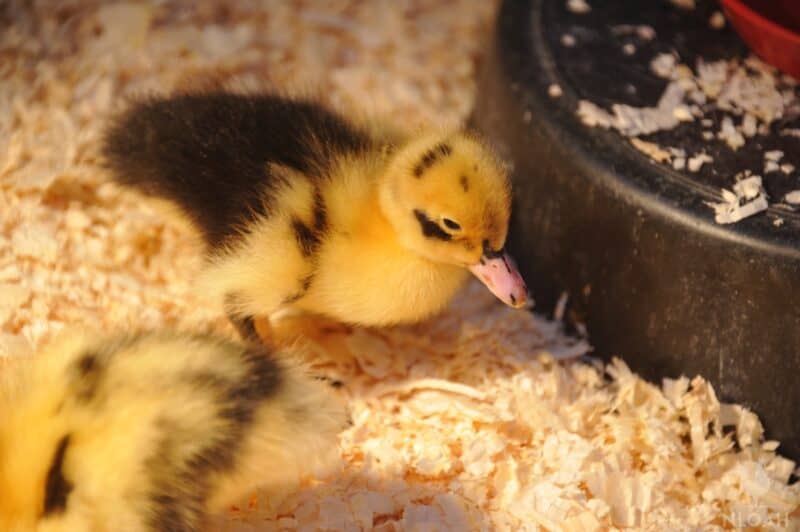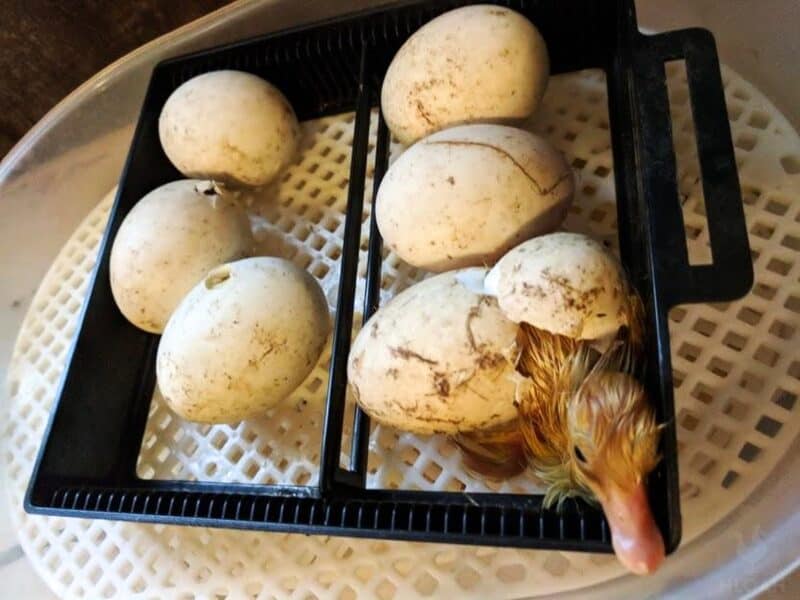Cute, precious baby animals are one of life’s greatest pleasures. But just like I always remember my parents saying, they don’t stay small for long. Babies tend to grow quickly, quicker than we expect, and before you know it, they have reached adulthood.

That’s certainly the case for ducklings, but there’s a little confusion out there concerning just how long you can expect them to stay small. So, how quickly do ducklings grow?
Ducklings grow surprisingly quickly, reaching near-complete physical maturity in just 8 to 10 weeks on average, although they still have a little bit of development to go after that.
Considering how big ducks are, this is a remarkable rate of growth. That said, while ducklings will optimally reach their full-grown size in just a couple of months or a bit longer, things don’t always go according to plan if you don’t know what you’re doing.
Keep reading and I’ll tell you about more facts concerning the growth rate of ducklings, and four things that can definitely hinder their growth.
Ducklings are Still Developing After Reaching Physical Maturity
Just to clarify the answer I gave above, you should know that ducklings are still physically developing to a degree after they reach their full-grown size in just 8 to 10 short weeks as a rule.
However, depending on the breed they may not have their full, adult feathers after reaching this size, and even though their skeleton has reached maximum size their muscles, connective tissues, and other bodily systems and organs still have a little way to go.
Ducks will also not be sexually mature during this time, coming a little bit later, anywhere from 4 to 6 months old.
Do Ducklings Grow Faster Than Chickens?
Yes, they do. This is very easy to see if you ever try to raise ducklings and chicks at the same time. Most chickens don’t reach full physical maturity equivalent to that of ducks until 12 to 15 weeks…
That said, there can be some overlap if you have a breed of chickens that is known for much faster growth, particularly your commercial strains that have been developed to reach a size suitable for slaughter as quickly as possible, like some Leghorns.
Do All Duck Breeds Grow at the Same Rate?
No. Various domestic duck breeds have different growth rates, with some growing much quicker than others. A good rule of thumb is that your smaller breeds tend to grow quicker overall and fully develop earlier, usually taking no longer than 9 weeks. Calls are a tiny bantam breed that grows quite quickly!
Likewise, your larger, heavier breeds develop more slowly, taking anywhere from 14 to 16 weeks compared to baseline, even longer, with sexual maturity arriving sometime after that. Rouens are notoriously slow growers, for instance.
However, there are exceptions, with ducks that have been developed for commercial meat production growing extremely quickly as with chickens.
Certain Pekin varieties are such a breed, but this growth and large size come at a cost: these poor birds typically don’t live as long as other ducks.
What is the Fastest Growing Duck Breed?
Among bigger breeds, it would have to be Pekins. These ducks have a long history of being developed for rapid growth thanks to their constant use for meat. By about 8 weeks, they are effectively fully grown and ready to slaughter.

What is the Slowest Growing Duck Breed?
Rouens, again, and particularly the exhibition strains. These massive ducks are very slow to grow and put on weight slowly which is surprising in light of their massive appetites. It takes the better part of a year for these birds to fully mature physically and sexually.
Things That Hinder Duckling Growth
Now, all of the figures I have given you above for maturation times are baselines with the assumption that ducklings are living in ideal conditions and being taken care of properly.
If they aren’t, they won’t grow as fast, and serious neglect or problems can even result in them being stunted and failing to attain full size.
Consider all of the following when you are raising ducklings, no matter what breed they are!
Lack of Calories and Protein
This is a big one, and one that chicken owners are likely to make if they aren’t careful. Ducklings need a lot more food compared to chicks, and considerably more protein during the first couple of weeks of life to sustain their explosive growth.
As a rule, you’ll definitely want to give them starter feed that is nutritionally balanced for their needs. Note that their protein intake should taper off steadily after week 3, going down from an 18 to 20% formulation to a 15 to 16% formulation.
Lack of Vitamin B3/Niacin
Ducks are like all other waterfowl in that they need tons of vitamin B3, also known as niacin. This vitamin is absolutely essential for proper and rapid growth. The National Research Council prescribes 55 mg of vitamin B3 for every 2.2 lb of feed.
If you’re giving ducklings starter feed that’s nutritionally complete, this should already be in there, but if you are mixing your own feed for whatever reason, you must make sure this is included at the right rate.
If it’s not, their growth will slow dramatically, and they can even suffer from bone and muscular deformities!
Stress
Ducklings tend to be happy and healthy as long as they’re in a good environment, and that means they will grow quickly. However, any source of intense or chronic stress is going to cause major problems and seriously reduce growth rates.
If they are too hot, too cold, too crowded, hungry, thirsty, living in filthy conditions, or exposed to loud sounds or predators, they’ll get and stay stressed out.
Temperature is a big one for ducklings, and allowing them to get too cold or exposing them to cold drafts is one of the leading causes of stress and illness.
Illness
Speaking of illness, you’ve got to do everything you can to keep your ducklings from getting sick if you want them to grow quickly.
Letting them get chilled is a sure way for them to fall ill. Also, not taking care to keep their food, water, and bedding scrupulously clean can quickly lead to disease that can burn through your young flock.
Another point is to practice good biosecurity protocols: don’t let them come into contact with any other animals, including poultry, and keep your hands and anything else that you’re using to interact with them clean and sanitized.
Injury
Ducklings are quite vulnerable during the first two weeks of life. If something can go wrong, it usually will at this time, and it usually results in a nearly crippled or even dead bird.
If they get injured from a drop or fall, improper handling, entanglement, or even crushing in a pile of its siblings that are trying to stay warm, chances are good it will be stunted for life. Yes, even if they survive the incident.
The demands of healing alongside growth tend to be an either-or situation for the poor thing. You must do everything you can to avoid accidentally injuring your birds and keep them from injuring themselves.
Adjust Conditions and Feeding as Ducklings Age for Maximum Growth
Whatever kind of ducks you have, make sure that you are adjusting the conditions they live in and your feeding as they grow. This is essential to preventing stress, too.
For instance, as I mentioned above, your ducklings don’t need as much protein as they age past the two-week mark. They will need more calories, and this means a different type of feed and different portions. Changing feed brands to accommodate this might mean that you need to now start supplementing niacin or other nutrients in their food.
Likewise, as they develop they don’t need to be kept quite as warm, so you need to turn down the heater or reposition the heat lamp in order to keep them comfortable and avoid overheating them.
Space will become an issue, and fast, as they grow, and you’ll need to expand the brooder or put them in a bigger brooder box accordingly.
If you fail to keep up with their age-appropriate requirements, they won’t grow as quickly!
Tom has lived and worked on farms and homesteads from the Carolinas to Kentucky and beyond. He is passionate about helping people prepare for tough times by embracing lifestyles of self-sufficiency.
